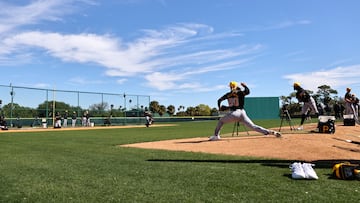MLB expansion: What cities could get baseball franchises?
Ultimately, the decision on expansion or relocation leans on many variables and will have far-reaching implications for the future of Major League Baseball.


According to sources close to Major League Baseball, the league is preparing for the inevitable addition of two new franchises, which could bring in over $4 billion in expansion fees. While there are no solid plans for expansion, the possibility of a nine-figure financial boost for each existing team has generated renewed interest and discussion. However, sources indicate that expansion is unlikely until the early 2030s. Salt Lake City and Las Vegas have appeared as potential destinations for new teams, with reports (still not confirmed) of the Oakland A’s potentially relocating to Las Vegas.
Salt Lake City, Las Vegas, Nashville...
Last year, a piece of specific news initiated a debate about expanding Major League Baseball (MLB) to new cities. A group in Salt Lake City, which includes a former Utah Jazz owner, has launched a campaign to secure an MLB expansion team. At the same time, news has emerged that Las Vegas is also on the verge of securing the Oakland A’s franchise, but the deal is not yet official.
It looks like the Oakland A’s are moving to Las Vegas. And the giant Sphere is already welcoming the team.
— ABC News (@ABC) November 16, 2023
MLB owners approved the franchise’s relocation on Thursday.
The A's will play at least one more year in Oakland. The team plans for a new Vegas ballpark to open in 2028. pic.twitter.com/gnDwoq4Btl
In the last decade, the discussion around expansion cities has been ongoing, with several factors being considered, including market size, population growth, existing sports infrastructure, and local support. A previous analysis evaluated potential expansion cities based on these criteria, narrowing the list to viable contenders such as Salt Lake City, Portland, Nashville, and Montreal.
Montreal instead of Tampa
However, it’s becoming increasingly clear that not all cities are equally enthusiastic about hosting an MLB team. Some towns may enter the competition late, while others actively pursue opportunities to bring professional baseball to their communities. Additionally, the Tampa Bay Rays are at risk of relocation, with Montreal emerging as a potential new home if efforts to secure a new ballpark in the Tampa area fall through. For Montreal, the prospect of landing an expansion team hinges on the fate of the Rays, as the city has shown little interest in pursuing an expansion franchise independently. While relocating the Rays to Montreal may temporarily boost attendance, the team’s long-term viability remains uncertain.
BREAKING: The Tampa Bay Rays have received MLB's permission to explore becoming two-city team: the Tampa Bay area and Montreal, sources tell ESPN. The plan: Play early-season home games in the Tampa Bay area and finish the season in Montreal. News at ESPN: https://t.co/X6uSt4KLfC
— Jeff Passan (@JeffPassan) June 20, 2019
Related stories
In contrast, cities like Nashville actively campaign for an MLB team backed by local investors and community support. Led by former major league pitcher Dave Stewart, efforts to bring baseball to Nashville have gained momentum, with plans for a new ballpark and a proposed team name, the Nashville Stars.
The choice between expansion and relocation becomes increasingly complicated, with considerations ranging from market dynamics to geographic location. While larger markets like Salt Lake City offer potential for growth, smaller cities like Nashville boast passionate fan bases and a strong sense of community. Which cities will ultimately be chosen for expansion or relocation remains to be seen, but the conversation will continue in the coming months.

